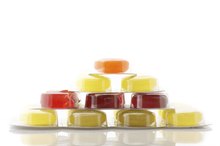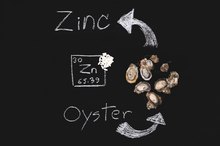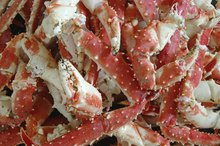What does fact checked mean?
At Healthfully, we strive to deliver objective content that is accurate and up-to-date. Our team periodically reviews articles in order to ensure content quality. The sources cited below consist of evidence from peer-reviewed journals, prominent medical organizations, academic associations, and government data.
- Office of Dietary Supplements: Zinc
- Dialysis & Transplantation: Does Zinc Supplementation Improve Dietary Intake, Symptoms of Eating Problems, and Serum Zinc Levels in Hemodialysis Patients?
- Advanced Pharmaceutical Bulletin: Effects of Zinc Supplementation on the Anthropometric Measurements, Lipid Profiles and Fasting Blood Glucose in the Healthy Obese Adults
- Advanced Pharmaceutical Bulletin: Effects of Zinc Supplementation on the Anthropometric Measurements, Lipid Profiles and Fasting Blood Glucose in the Healthy Obese Adults
The information contained on this site is for informational purposes only, and should not be used as a substitute for the advice of a professional health care provider. Please check with the appropriate physician regarding health questions and concerns. Although we strive to deliver accurate and up-to-date information, no guarantee to that effect is made.
Zinc for Appetite Control
You need zinc in your diet for forming DNA, healing wounds and forming proteins. Zinc may also have an effect on appetite, but it may be more likely to increase appetite than decrease it.
Zinc and Appetite Loss
One of the symptoms of a zinc deficiency is a loss of appetite. Not getting enough zinc can also interfere with your sense of smell and taste and lead to anorexia and weight loss. Getting more zinc through diet or supplements to bring zinc levels back up to normal can rectify this situation 1.
Zinc as an Appetite Stimulant
Acid Reflux & Zinc
Learn More
People with certain health conditions sometimes have low appetites, leading them to not eat enough. This may include up to 70 percent of people with kidney problems who are being treated with dialysis. A study published in "Dialysis & Transplantation" in December 2010 found that people on dialysis given zinc supplements each day for 60 days had improved appetites and less nausea, while those in the control group had increased symptoms 12.
Zinc and Weight Loss
Although zinc may increase your appetite, there is also some limited evidence that it may help with weight loss. A study published in "Advanced Pharmaceutical Bulletin" in 2013 found that obese people who were given a zinc supplement for 30 days experienced decreases in both body weight and body mass index. The study authors note that this reduction in weight could be due to zinc acting in similar ways to insulin and zinc's effects on the production of leptin, a hormone that plays a role in regulating hunger.
Getting the Right Amount
Effects of Zinc With Potassium
Learn More
Men and pregnant women need at least 11 milligrams of zinc per day, and women need at least 8 milligrams per day to avoid becoming deficient in zinc. Good food sources of zinc include:
- oysters
- beef
- crab
- fortified cereal
- lobster
- beans
- nuts
- dairy products
Related Articles
References
- Office of Dietary Supplements: Zinc
- Dialysis & Transplantation: Does Zinc Supplementation Improve Dietary Intake, Symptoms of Eating Problems, and Serum Zinc Levels in Hemodialysis Patients?
- Advanced Pharmaceutical Bulletin: Effects of Zinc Supplementation on the Anthropometric Measurements, Lipid Profiles and Fasting Blood Glucose in the Healthy Obese Adults
- Mayo Clinic Laboratories, Test ID ZNS, Zinc, Serum
- Nakamura H, Sekiguchi A, Ogawa Y, Kawamura T, Akai R, Iwawaki T et al. Zinc deficiency exacerbates pressure ulcers by increasing oxidative stress and ATP in the skin.J Dermatol Sci. 2019 Jul 12. pii: S0923-1811(19)30197-5. doi: 10.1016/j.jdermsci.2019.07.004. [Epub ahead of print]
- National Institutes of Health, Office of Dietary Supplements, Zinc, Fact Sheet for Health Professionals
Writer Bio
Based in Massachusetts, Jessica Bruso has been writing since 2008. She holds a master of science degree in food policy and applied nutrition and a bachelor of arts degree in international relations, both from Tufts University.









